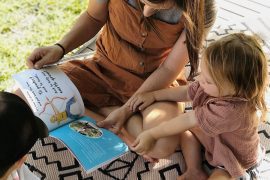By Sarah R. Moore
“Mama, I’m worried about something,” my child said to me at bedtime.
“What is it?” I asked.
“[This person, I’ll call him Danny] makes me really uncomfortable. He often asks me things that aren’t appropriate and then he keeps pushing until I answer. How can I make him stop?”.
Me: “Thank you for telling me.” (I always start with this, by the way, anytime my child shares something vulnerable.) I have some ideas, but they’re all things you already know how to do”.
Her: “What are they?”.
Me: “Well, you know how we’ve made what some people call ‘talking back’ safe in our home? How you can say whatever you want to me and I’ll pay attention, even if you have an opinion that differs from mine?”.
Her: “Yes”.
Me: “Well, all that practice with making talking back feel safe to you — so you can push back in ways that are both respectful AND clear — this is the kind of thing all of that practice was for. You can absolutely talk back to Danny”.
Her: “Oh! I can do that?”.
Me: “Yes, of course you can. Would you like to practise some scenarios with me now?”.
Her: “Yeah, could we? Here are the types of things he says that make me uncomfortable….[details]. Can you pretend to be him and say some of these things so I can practise some more, imagining it’s him?”.
Me: “Absolutely. The more we practise, the more ‘muscle memory’ we’ll create in your brain for when it happens in real life with him”.
We practised several scenarios, her growing in her confidence every time.
Her: “Thanks, Mama. That was really helpful. Thank you for allowing me to learn how to talk back to you. You’ve always said it’s a life skill, and I see that now”.
Me: “Of course, sweetheart — and you can always come to me if you need support. I’m on your side and will always believe you”.
*
THIS is one of the many reasons I will never push blind obedience. THIS is one of the reasons I let my child disagree with me. THIS is one of the reasons we’ve discussed boundaries and healthy expression of anger and emotional intelligence — all before the age of 10. Because whether it’s at 10, earlier, or later, children will absolutely need to know they can and should use their voices when ANYONE makes them uncomfortable. This is how we raise a generation of children who are NOT people-pleasers, who will be able to push back on peer pressure or otherwise, who will be able to stand up to “tricky” adults, and who will know from the very beginning that their voice has mattered all along.
With love,
Sarah, author of “Peaceful Discipline”
This post was originally shared on the author’s Facebook page.
Sarah R. Moore is the author of Peaceful Discipline: Story Teaching, Brain Science & Better Behavior and founder of Dandelion Seeds Positive Parenting. As a certified Master Trainer in conscious parenting and Board Member for the American Society for the Positive Care of Children, she’s also a public speaker, armchair neuroscientist, and most importantly, a Mama. With training in child development, trauma recovery, interpersonal neurobiology, improv comedy and play, her work supports parents and caregivers around the globe. Follow her on Instagram, Facebook, YouTube, TikTok, Pinterest & Threads.











